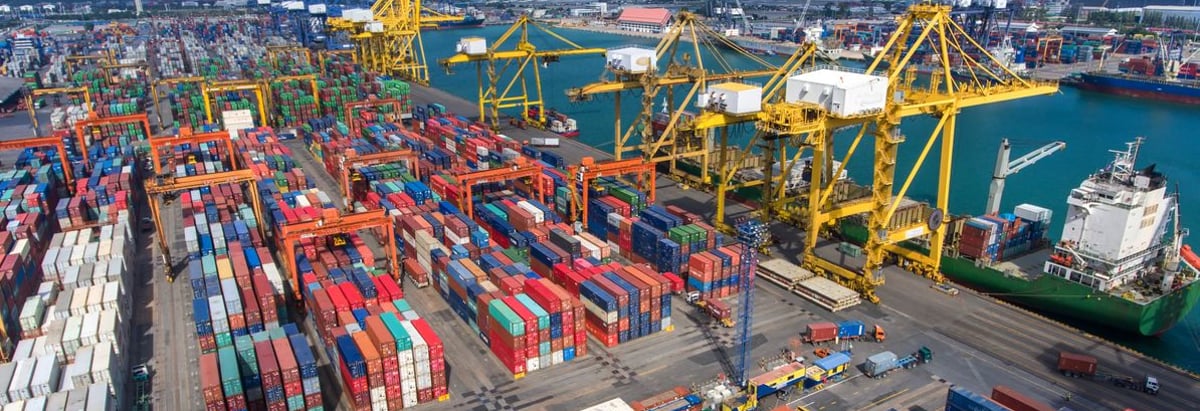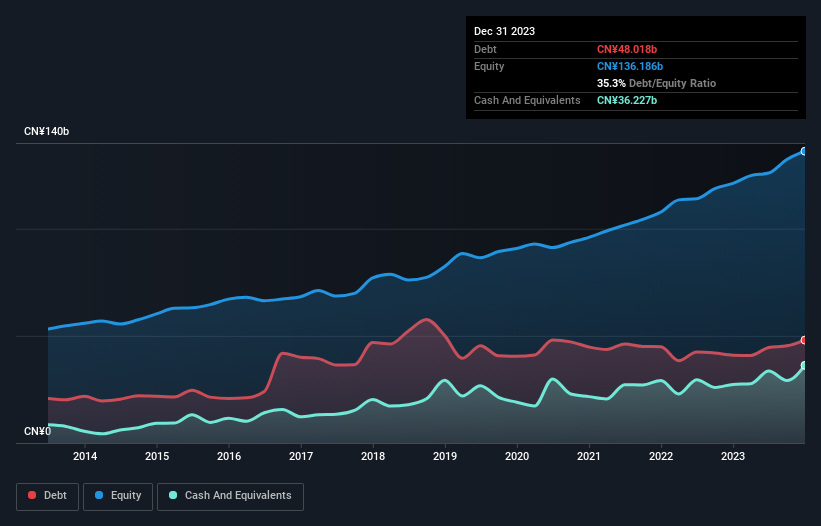- China
- /
- Infrastructure
- /
- SHSE:600018
Shanghai International Port (Group) (SHSE:600018) Could Easily Take On More Debt

Warren Buffett famously said, 'Volatility is far from synonymous with risk.' So it might be obvious that you need to consider debt, when you think about how risky any given stock is, because too much debt can sink a company. We can see that Shanghai International Port (Group) Co., Ltd. (SHSE:600018) does use debt in its business. But is this debt a concern to shareholders?
What Risk Does Debt Bring?
Debt and other liabilities become risky for a business when it cannot easily fulfill those obligations, either with free cash flow or by raising capital at an attractive price. If things get really bad, the lenders can take control of the business. However, a more frequent (but still costly) occurrence is where a company must issue shares at bargain-basement prices, permanently diluting shareholders, just to shore up its balance sheet. Of course, debt can be an important tool in businesses, particularly capital heavy businesses. When we think about a company's use of debt, we first look at cash and debt together.
View our latest analysis for Shanghai International Port (Group)
How Much Debt Does Shanghai International Port (Group) Carry?
You can click the graphic below for the historical numbers, but it shows that as of December 2023 Shanghai International Port (Group) had CN¥48.0b of debt, an increase on CN¥41.0b, over one year. However, it does have CN¥36.2b in cash offsetting this, leading to net debt of about CN¥11.8b.

How Strong Is Shanghai International Port (Group)'s Balance Sheet?
Zooming in on the latest balance sheet data, we can see that Shanghai International Port (Group) had liabilities of CN¥22.8b due within 12 months and liabilities of CN¥44.6b due beyond that. Offsetting these obligations, it had cash of CN¥36.2b as well as receivables valued at CN¥4.93b due within 12 months. So it has liabilities totalling CN¥26.2b more than its cash and near-term receivables, combined.
This deficit isn't so bad because Shanghai International Port (Group) is worth a massive CN¥130.6b, and thus could probably raise enough capital to shore up its balance sheet, if the need arose. But we definitely want to keep our eyes open to indications that its debt is bringing too much risk.
We use two main ratios to inform us about debt levels relative to earnings. The first is net debt divided by earnings before interest, tax, depreciation, and amortization (EBITDA), while the second is how many times its earnings before interest and tax (EBIT) covers its interest expense (or its interest cover, for short). Thus we consider debt relative to earnings both with and without depreciation and amortization expenses.
Shanghai International Port (Group) has a low debt to EBITDA ratio of only 0.91. But the really cool thing is that it actually managed to receive more interest than it paid, over the last year. So there's no doubt this company can take on debt while staying cool as a cucumber. Also good is that Shanghai International Port (Group) grew its EBIT at 11% over the last year, further increasing its ability to manage debt. The balance sheet is clearly the area to focus on when you are analysing debt. But it is future earnings, more than anything, that will determine Shanghai International Port (Group)'s ability to maintain a healthy balance sheet going forward. So if you want to see what the professionals think, you might find this free report on analyst profit forecasts to be interesting.
Finally, a business needs free cash flow to pay off debt; accounting profits just don't cut it. So we clearly need to look at whether that EBIT is leading to corresponding free cash flow. During the last three years, Shanghai International Port (Group) generated free cash flow amounting to a very robust 84% of its EBIT, more than we'd expect. That positions it well to pay down debt if desirable to do so.
Our View
The good news is that Shanghai International Port (Group)'s demonstrated ability to cover its interest expense with its EBIT delights us like a fluffy puppy does a toddler. And the good news does not stop there, as its conversion of EBIT to free cash flow also supports that impression! We would also note that Infrastructure industry companies like Shanghai International Port (Group) commonly do use debt without problems. Looking at the bigger picture, we think Shanghai International Port (Group)'s use of debt seems quite reasonable and we're not concerned about it. While debt does bring risk, when used wisely it can also bring a higher return on equity. There's no doubt that we learn most about debt from the balance sheet. However, not all investment risk resides within the balance sheet - far from it. Case in point: We've spotted 1 warning sign for Shanghai International Port (Group) you should be aware of.
At the end of the day, it's often better to focus on companies that are free from net debt. You can access our special list of such companies (all with a track record of profit growth). It's free.
New: Manage All Your Stock Portfolios in One Place
We've created the ultimate portfolio companion for stock investors, and it's free.
• Connect an unlimited number of Portfolios and see your total in one currency
• Be alerted to new Warning Signs or Risks via email or mobile
• Track the Fair Value of your stocks
Have feedback on this article? Concerned about the content? Get in touch with us directly. Alternatively, email editorial-team (at) simplywallst.com.
This article by Simply Wall St is general in nature. We provide commentary based on historical data and analyst forecasts only using an unbiased methodology and our articles are not intended to be financial advice. It does not constitute a recommendation to buy or sell any stock, and does not take account of your objectives, or your financial situation. We aim to bring you long-term focused analysis driven by fundamental data. Note that our analysis may not factor in the latest price-sensitive company announcements or qualitative material. Simply Wall St has no position in any stocks mentioned.
About SHSE:600018
Shanghai International Port (Group)
Shanghai International Port (Group) Co., Ltd.
Flawless balance sheet with solid track record.


